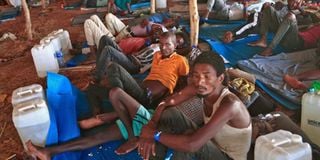Premium
Ethiopia's Abiy right to crack down on TPLF separatists

Ethiopian refugees who fled fighting in Tigray province lay in a hut at the Um Rakuba camp in Sudan's eastern Gedaref province, on November 18, 2020.
The ongoing war in Ethiopia has already killed hundreds of combatants, driven 14,500 people into Sudan and raised fears of a protracted civil war in Ethiopia. This could have been avoided had the leaders of Tigray People's Liberation Front listened to voices of reason and worked with the national government in Addis Ababa.
But pride comes before a fall.
Now the once thriving Tigray region has been turned into a wasteland, cut off from the outside world with no internet or telephone service. Ethiopian fighter jets buzz over the heads of poor farmers, targeting TPLF bases and ammunition depots. The UN’s refugee agency says it is worried about the fate of 96,000 Eritrean refugees living in the region.
To discourage destructive forces that feed on wars, terrorism, and chaos to prevail, all the governments in the Horn and East African region must raise their voice against TPLF's rebellion and support the Ethiopian government in unifying the country to discourage other separatists and rebels in the region.
In almost every country in the region, there is some sort of a rebellion within its borders, some are latent, others are active and more dangerous. It is, therefore, in each country's interest to be its neighbour's keeper. TPLF, whose actions are increasingly mimicking the tactics of terrorists, must be stopped before it is too late.
TPLF, which effectively ruled Ethiopia for nearly three decades, is not only angry at an Ethiopia led by Prime Minister Abiy, who hails from the majority Oromo ethnicity, but it is also determined to defy any order that can hold Tigrayans who, according to Abiy, “committed gross human rights abuses and massive corruption,” to book.
Elections
When last March the Ethiopian parliament postponed national elections, due to the Covid-19 pandemic, TPLF leaders rejected the vote and last September organised – in defiance of Addis Ababa’s pleas not to do so – its local elections.
After the election in which TPLF won overwhelmingly, the Mekelle-based administration declared the federal government in Addis Ababa illegitimate, saying its time had expired and that Prime Minister Abiy’s authority was illegally in power.
There would be no government anywhere in the world that would accept a minority of the elites of one ethnic group, which represents just around six million out of Ethiopia’s 110 million population, to dictate terms to it. TPLF’s contempt for the current Ethiopian government has a sinister motive behind it.
Tigrayan elites and generals, who have used their decades-old rule in Ethiopia to line their pockets, don’t want a united Ethiopia that can end the destabilising ethnic federalism, the bane of Ethiopia's more than 80 ethnicities.
TPLF leaders will soon realise that their defiance and “brinkmanship,” in the words of Prime Minister Abiy, will have serious legal and political consequences. Addis Ababa on Thursday stripped 39 TPLF members of immunity, among them the region’s President Debretsion Gebremichael.
On Friday, Prime Minister Abiy named a new president in his place, which means the old order has officially been dismantled and replaced with a new one.
Dangerous state
The war has already plunged the Tigrayan region into a dangerous state which, if not arrested, could lead to genocide. On the night of November 9, Tigrayan forces, both the regional police and TPLF militia, murdered scores of civilians in a town in the South West Zone of Ethiopia’s Tigrayan Region, according to an Amnesty International report on Thursday.
Witnesses told the organisation that most of the victims were labourers from the Amhara ethnic group, which shares a border with the Tigrayan region. The UN High Commissioner for Human Rights Michelle Bachelet Friday expressed alarm at the massacre, saying if confirmed the killings could “amount to war crimes.” The Ethiopian government says it has launched charges against top TPLF leaders, arguing that their actions constitute treason.
Complaints by Tigrayan leaders that the national government has targeted their tribe are shameful excuses intended to divert attention from their sabotage across the country. Prime Minister Abiy said TPLF wants to make Ethiopia ungovernable by financing -- thanks to the money it looted from the national government -- “horrendous crimes in several parts of the country.”
The East African region must not allow merchants of chaos to doom Ethiopia. The Tigrayan people must also not allow criminals and thieves looking for a hideout to enjoy their loot to destroy what their region has achieved in the last 27 years. The world must stand with Prime Minister Abiy until he crushes TPLF criminals once and for all.




